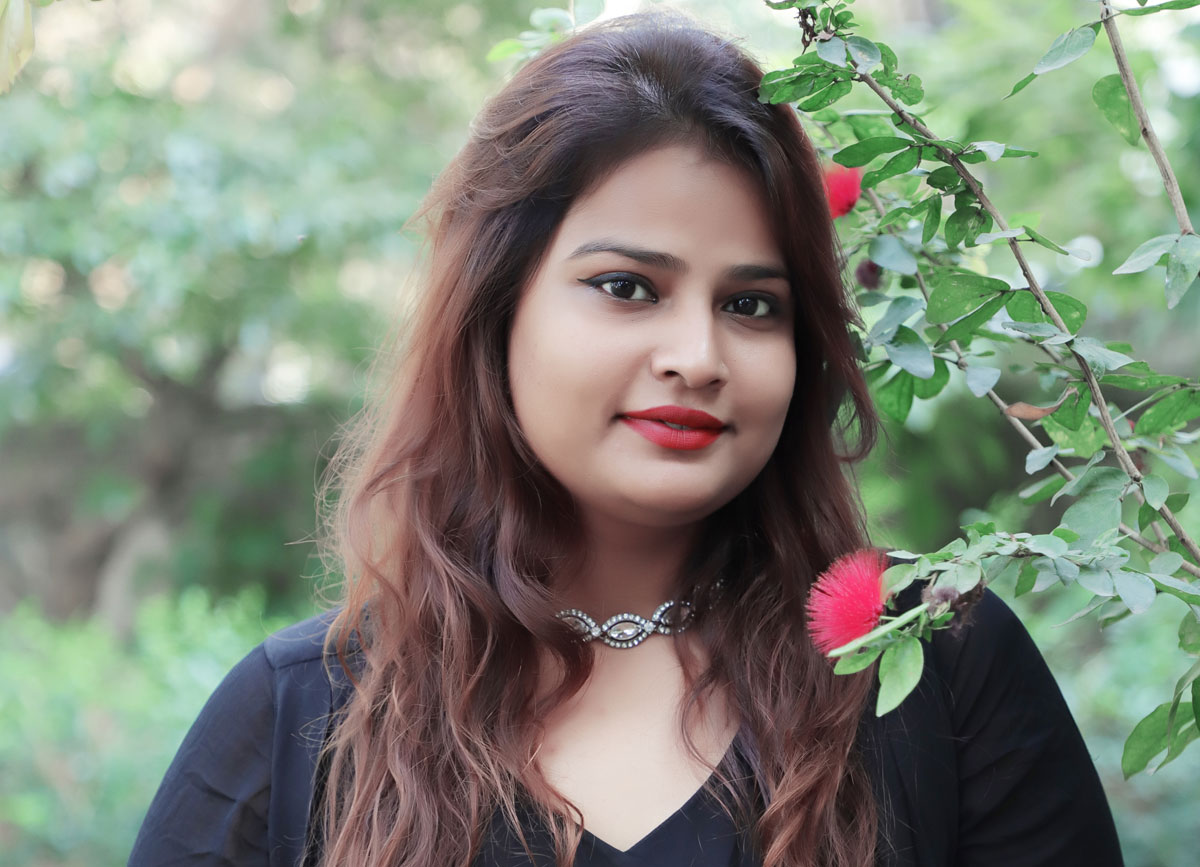Yogita Gawli “Pad Woman”
“I Don’t Want To See Any Girl Miss Her School Due To Her Monthly Cycle.”
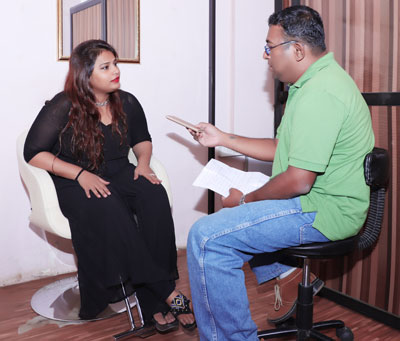
![]()
Yogita Arun Gawli doesn’t dream of making it big in the commercial world, she has instead chosen to start a social entrepreneurial venture which will benefit the socio-economically compromised community.
Being the 3rd generation of an illustrious family supporting social up-liftment causes, she plans to take the same to the next level through Kara Foundation, an NGO she set up for bringing the marginalized community into the main stream.
Having completed her Masters in Political Science with an internship with SAARC in Kathmandu on Poverty Alleviation, she has in-depth knowledge and understanding of the Governments Public policy-making. She plans to use the same and transcend the benefits of these pro-marginalized people based policies of the Government to the community through her Kara Foundation.
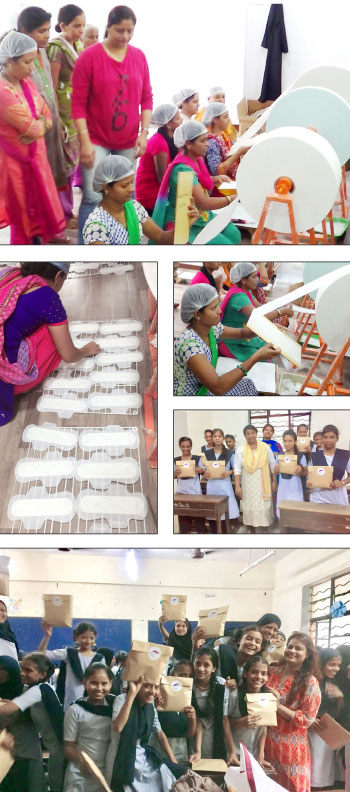 Daughter of Arun and Asha Gawli, Yogita has hands on experience of political campaign management for the family wherein she has interacted with and understood the constituency people and their issues first hand. She plans to alleviate their major problem of poverty due to lack of education, employment and health by implementing the various government schemes and passing on their benefits to the socio- economically compromised communities.
Daughter of Arun and Asha Gawli, Yogita has hands on experience of political campaign management for the family wherein she has interacted with and understood the constituency people and their issues first hand. She plans to alleviate their major problem of poverty due to lack of education, employment and health by implementing the various government schemes and passing on their benefits to the socio- economically compromised communities.
Her goal is to bring a smile to the face of the marginalized community through her selfless devotion of time and resources to the cause of social up-liftment in urban and rural areas of Maharashtra.
Kara Foundation which she started in September 2016 is based on Yogita’s belief in giving back to the society which has given her so much.
The core focus is on Health and Hygiene for the girl child, women empowerment and youth entrepreneurial skill building. Yogita’s dream is to see that no girl child in Maharashtra misses her school or college during her monthly cycle due to the lack of a hygienic sanitary solution.
In her project, every woman is ensured of some financial independence through the foundations work from home projects.
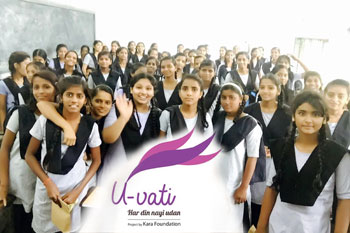 Kara Foundation endeavours to enhance the lives of the girl child, youth and women by providing differentiator solutions to all three sections of the socio-economically compromised community.
Kara Foundation endeavours to enhance the lives of the girl child, youth and women by providing differentiator solutions to all three sections of the socio-economically compromised community.
VERUS FERREIRA met up with Founder and Managing Trustee of Kara Foundation YOGITA GAWLI to know more about her NGO and her core focus on providing hygienic sanitary solutions for the girl child.
What inspired you to start Kara Foundation?
The interest has always been in me to do some social work and I felt this more after I completed my Masters in Political Science with an internship with SAARC in Kathmandu on 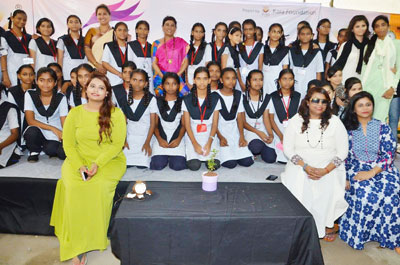 Poverty Alleviation. Women empowerment was always in my mind, but I also wanted to do take up a common cause which was always neglected and I thought why not focus on the problems faced by women. Then I did a little bit of research and found that almost 80 per cent of Indian women have health issues by not using sanitary pads. There were young girls in Mumbai who were not using it. It was then that I thought of creating our own manufacturing unit where women would be trained and earn a livelihood and bring out a product that is not harmful for the environment. We went to many places like Jaipur, Rajasthan, we also met Arunachalam Muruganantham, a social activist from Tamil Nadu, whose mission was to provide sanitary napkins to poor women of rural areas and is today known as Pad Man to know more about the situation. But taking the machinery to Mumbai would be difficult and so we met up with a manufacturer in Mumbai which is ISO certified
Poverty Alleviation. Women empowerment was always in my mind, but I also wanted to do take up a common cause which was always neglected and I thought why not focus on the problems faced by women. Then I did a little bit of research and found that almost 80 per cent of Indian women have health issues by not using sanitary pads. There were young girls in Mumbai who were not using it. It was then that I thought of creating our own manufacturing unit where women would be trained and earn a livelihood and bring out a product that is not harmful for the environment. We went to many places like Jaipur, Rajasthan, we also met Arunachalam Muruganantham, a social activist from Tamil Nadu, whose mission was to provide sanitary napkins to poor women of rural areas and is today known as Pad Man to know more about the situation. But taking the machinery to Mumbai would be difficult and so we met up with a manufacturer in Mumbai which is ISO certified  who could help us produce biodegradable pads. We started this unit in July 2017. We now have 12 women working for us. We have 10 BMC schools and 552 girls who we have adopted for their monthly sanitary needs, all this for free. My target is to have around 2000 girls benefit by this year end.
who could help us produce biodegradable pads. We started this unit in July 2017. We now have 12 women working for us. We have 10 BMC schools and 552 girls who we have adopted for their monthly sanitary needs, all this for free. My target is to have around 2000 girls benefit by this year end.
So how is the sanitary pad different from the branded ones? What is the quality of the sanitary pads you make?
Our product is called ‘U-vati’ and cost around Rs. 35 – 40 a month for 8 pads, which comes to around Rs. 480 a year for a girl’s yearly sanitary hygiene. The product is a handmade, completely chemical free, regular in size, user and skin friendly, 100 per cent biodegradable pad. The pads made by branded companies are super absorbent material and are 90 per cent plastic and cause a lot of health problems such as a weak immune system, pelvic inflammatory disease, ovarian cancer, hormone dysfunction and so on. Unlike branded companies who spend on packaging, brand name and other factors which make their price above Rs. 60 and Rs. 70 for a pack of 6, our price is low due to the products we use.
How do you source funds for this project?
As of now it is self funded, but we are always looking at help from anyone who is willing to give us a hand.
Is the product available in the market?
We have not got to the point of selling these pads, we presently donate. But now to cover costs due to the running of the unit, the salary of the women, the raw material and other expenses, we are slowly going to put the pads up for sale. One we do this we would even appeal to society at large to come and help us contribute so that we can adopt more girls for our cause.
Do think the government or any other NGO would collaborate with you and together you could make this a pan India movement?
We are hoping for it and I do hope so because the cause is good as I think that the pads should be given free to at least the girls who are from the poorer category or those who cannot afford it. I feel that once they are used to using these pads, when they grow older and more independent by themselves, they can also buy it for themselves. And I feel the government should support us because it’s a product that is Make In India, by Indian women. As for the availability of the pads, now it’s only Mumbai, we then plan on slowly covering all of Maharashtra and then all over India.
 How has the response been to the product?
How has the response been to the product?
We are just about one and a half year old and the BMC schools have shown a great interest and are very cooperative with us in what we are doing. Every month we go to schools and have health camps for girls on the same issue.
What is your monthly production numbers?
It’s around 2000 to 3000 pads, but now since we are not into sales, but once we get into sales, our production would be more and our cost would also be less.
Have you received any requests or queries from overseas?
I want to get associated.
Does your family support the work that you do, especially your dad?
Yes, my family is very supportive in this and my dad is very supportive for social causes and especially for the girl child. They don’t feel its taboo; it’s something that has to be acknowledged, to be known and to be respected. In the lower middle class they are so neglected that the women themselves start neglecting themselves, not taking care of themselves, using the old fashioned way of an old cloth, dry leaves, for their menstruation, which later causes infection. We want to change this monthly problem, for it is natural, not something to make a big issue about, but also something that needs to be taken care of.
There’s also a Bollywood movie ‘Pad Man’ based on the real story of India’s pad man Arunachalam Muruganantham releasing this month. Do you think this movie would give an answer to the problems of women and make them think?
Well I think that people should be entertained and at the same time learn that how one man from a rural area felt it important to take the imitative and do this. This film would make an impact and make women feel that this is an important thing to know about and make them feel that they should give their attention to.
Are you trying to associate yourself with the movie in anyway?
Well I am trying my best to contact Akshay Kumar. But I think he is busy promoting his movie and I am sure that if he knows about my NGO, he would surely support it since he is so much into showcasing the cause in the film.
 The sanitary pads are one aspect of your Foundation, what other projects are you involved with?
The sanitary pads are one aspect of your Foundation, what other projects are you involved with?
First we had initiated a project on women empowerment. I found that women are very talented when it comes to government schemes. But though the government has many courses for women, the problem is that after doing these courses, the women are still at home. So I thought it would be good to have a project where women can also work from home. So we have this project called Godhri (quilt), which is a dying art of Maharashtra. We thought we’d revive it. Godhri is basically a multi colored hand made quilt. So we taught women how to design it, how to stitch it and give colourful designs to it. We also taught them how to make bags, earrings, pillow covers, mats and other things. The women learn from us, take the material from us, and have the option to work at home. Once done, we then exhibit it and try to give them a name and branding and in the end they make some money out of it.
How did you come up with the name Kara for your NGO?
When I was thinking about a name for my NGO, I wasn’t thinking too much into a Hindi sounding name or a Sanskrit or English name either, nothing too long too. I came up with the name Kar which means hands, and I added an ‘a’ to it and got ‘Kara’ which in Marathi means ‘to do’, like to do something for a good cause. It has many other good meaning in Sanskrit like hope, upliftment and so on. So I thought this is the best, short and sweet and I kept it. It also has a double A, one ‘A’ for my father Arun and the other ‘A’ for my mother Asha.
How do you plan to take the Kara Foundation forward?
I am proud that I have initiated one project which is women empowerment and work from home and the girl project. We have put this together under this whole programme as U-vati, which means young girl. I look forward to the support of anyone to come forward and extend a helping hand.


